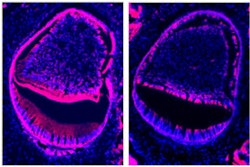Sequencing RNA to study oral cancer tumors could help better characterize the molecular basis of cancer development and define improved therapeutic strategies for treating an individual's specific cancer, according to a proof-of-principle study on oral carcinomas in the current issue of PLoS One.
To explore the advantages of massively parallel sequencing of RNA, researchers from the Mayo Clinic used a novel, strand-specific sequencing method using matched tumors and normal tissues of three patients with the specific cancer. They also analyzed the genomic DNA from one of the tumor-normal pairs that revealed numerous chromosomal regions of gain and loss in the tumor sample.
The key finding of this work was that alterations in gene expression which can arise from various genomic alterations frequently are driven by losses or gains in large chromosomal regions during tumor development, according to the study authors.
In addition to the specific tumor findings, the study also demonstrated the value of this RNA sequencing method, they said. It will allow researchers to measure strand-specific expression across the entire sample's transcriptome, revealing far more detail about genome-wide transcription than traditional microarrays.
"This method allows us to investigate genetic changes at a level that we were never able to see before," said study author David Smith, Ph.D., a Mayo Clinic genomics researcher, in a press release. "This provides us with much more information about alterations during cancer development that could reveal important therapeutic targets. We can more completely understand the relationship between an individual's genome and the alterations to that which result in disease."
Copyright © 2010 DrBicuspid.com



















